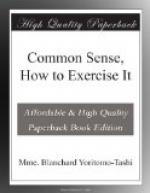This propensity toward pitying oneself unreasonably about little things which relate to one directly and this exaggerated development of a sterile sentimentality are almost always artificial, and the instinct of self-preservation very often aids in their extermination.
“Among my old disciples,” pursues the Shogun, “I had a friend whose son was afflicted by this kind of sentimentality, the sight of blood made him faint and he was incapable of aiding any one whomsoever; that which he called his good heart, and which was only a form of egotistical sentimentality, prevented him from looking at the suffering of others.
“One day, a terrible earthquake destroyed his palace; he escaped, making his way through the ruins and roughly pushing aside the wounded who told about it afterward.
“I saw him some days after; instead of reproaching him severely for his conduct, I endeavored to make him see how false was his conception of pity, since, not only had he not fainted at the sight of those who, half-dead, were groaning, but he had found in the egotistical sentiment of self-preservation the strength to struggle against those who clung to him, beseeching him for help.
“I demonstrated to him the evident contradiction of his instinctive cruelty to the sentimentality that it pleased him to make public.
“I made an appeal to common sense, in order to prove to him the attitude which he had, until then, assumed, and I had the joy of seeing myself understood.
“My arguments appealed to his mentality, and always afterward, when he had the opportunity to bring puerile sentimentality and common sense face to face, he forced himself to appeal to that quality, which in revealing to him the artifice of the sentiment which animated him, cured him of false sensibility, which he had displayed up to that time.”
Sentimentality is in reality only a conception of egotism, under the different forms which it adopts.
Yoritomo proves it to us again, in speaking of the weakness of certain teachers, who, under the pretext of avoiding trouble, allow their children to follow their defective inclinations.
“It is by an instinctive hatred of effort that parents forbid themselves to make their children cry when reprimanding them,” said he.
“If the parents wish to be sincere to themselves, they will perceive that the sorrow in seeing their children’s tears flow, plays a very small part in their preconceived idea of indulgence.
“It is in order to economize their own nervous energy or to avoid cleverly the trouble of continued teaching, that they hesitate to provoke these imaginary miseries, the manifestation of which is caused by the great weakness of the teachers.
“Common sense, nevertheless, ought to make them understand that it is preferable to allow the little ones to shed a few tears, which are quickly dried, rather than to tolerate a deplorable propensity for these habits which, later in life, will cause them real anxiety.”




